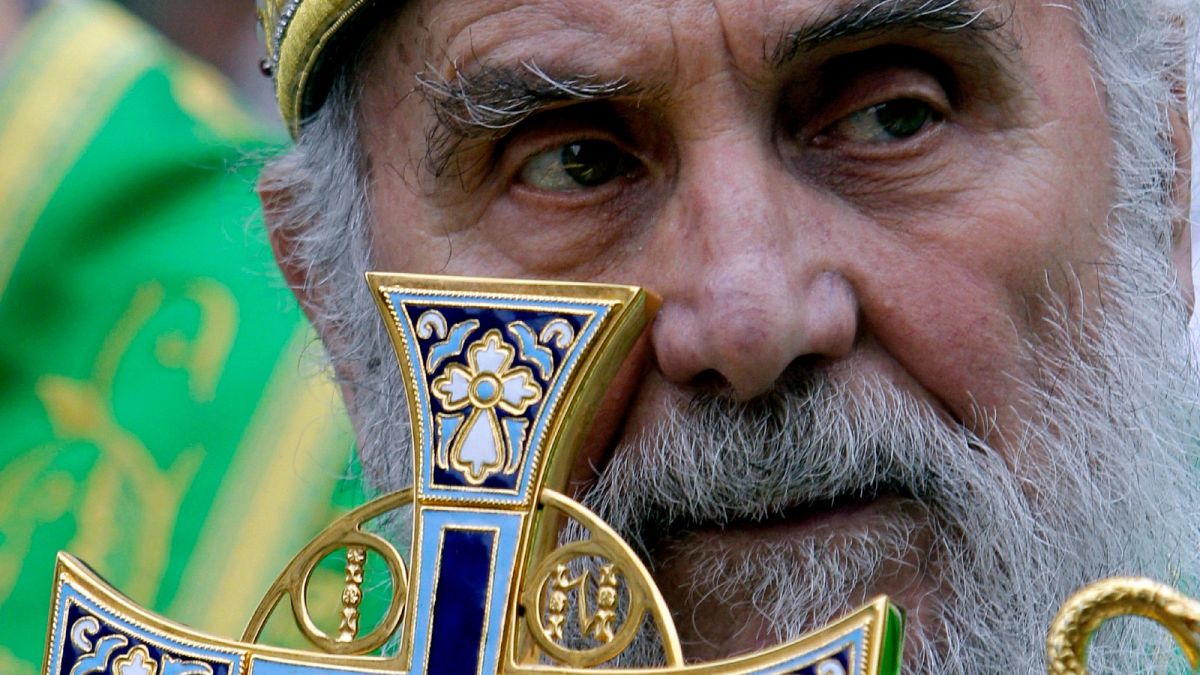Patriarch Irinej was taken to hospital earlier in November after going to the funeral of the head of the Serbian Orthodox Church in Montenegro, Bishop Amfilohije.
The leader of the Serbian Orthodox Church has died from COVID-19 aged 90.
Patriarch Irinej was taken to hospital earlier in November after going to the funeral of the head of the Serbian Orthodox Church in Montenegro, Bishop Amfilohije.
Bishop Amfilohije died from complications linked to COVID-19.
Thousands of mourners, most of them without masks, gathered at the funeral in the Montenegrin capital, Podgorica, on November 1, in violation of coronavirus-fighting measures proclaimed by the small Adriatic state's authorities. The burial turned out to be a major coronavirus-spreading event, with several high ranking church officials and others who were there later testing positive.
Patriarch Irinej died shortly after 7 am on Friday at a Belgrade military hospital, according to a brief church statement.
The government announced three days of national mourning as bells on churches across the country tolled.
Patriarch Irinej often criticised Western policies toward Serbia and urged close relations with Slavic ally Russia.
Like the rest of the Balkans, both Serbia and Montenegro are seeing daily record numbers of coronavirus cases and deaths, and hospitals are running out of beds.
Serbian President Aleksandar Vucic also attended the burial in Montenegro. Following the news of Irinej's death, Vucic posted on Instagram Friday: “It was an honour to have known you,” alongside a black and white photo of the patriarch. “People like you are never gone.”
Russian President Vladimir Putin sent a message of condolence to Vucic, praising the late patriarch for “strengthening the unity of the whole Orthodox world", according to Serbia's state TV.
Irinej, who wielded considerable political influence in Serbia, took over the church’s helm in January 2010 after the death of his predecessor, Patriarch Pavle, who was a highly popular and respected church leader in the Balkan country.
At the time, Irinej was seen as a relative moderate and a compromise choice among the factions within the church.
But throughout his church reign, he maintained the hardline nationalist stance the church developed during the wars that cleaved the Balkans in the 1990s. That included beliefs that the Serbs were historic victims of injustice and played on alleged anti-Serb policies in rival Balkan nations as well as the international community.
He often criticised Western policies toward Serbia over its breakaway Kosovo province, which unilaterally declared independence in 2008, and he kept close relations with the Russian Orthodox Church and the populist Serbian president.
Irinej’s traditional enthronement was held in Kosovo in October 2010 to underscore his dedication to Serbian historic claims that the majority ethnic Albanian-populated former province is the cradle of its statehood.
“We can’t and must not give away what has been ours for centuries and which has never in history belonged to the Albanian state, even if it has been taken from us and put under foreign occupation,” Irinej said in an interview posted on the church’s website.
Irinej added that “our biggest problem is not our centuries-old neighbours, the Albanians, but ‘developed’ Europe and the West in general.”
Irinej, however, was among the rare Serbian church dignitaries who openly called for improved ties with the Roman Catholic Church. He said the two churches should overcome historic differences.
The Serbian church is one of a group of autocephalous, or independent, churches that make up the Orthodox Christian faith. The Orthodox Churches split from the Vatican and the Roman Catholic Church in the 11th century in an event called the Great Schism.


